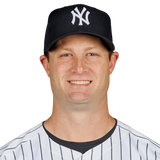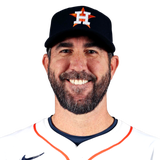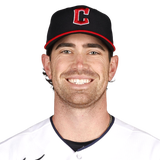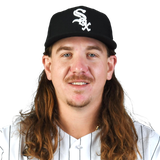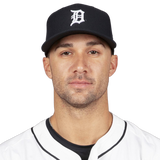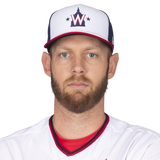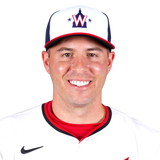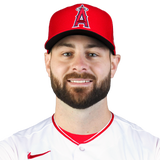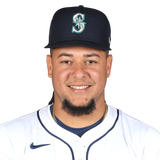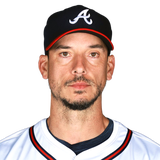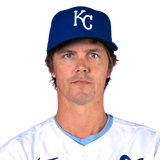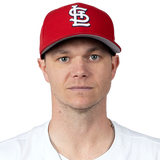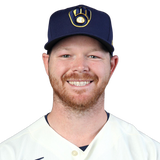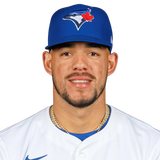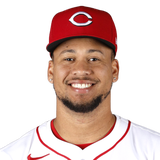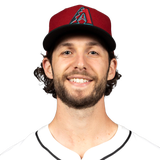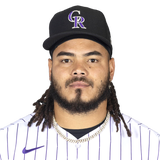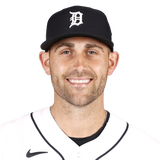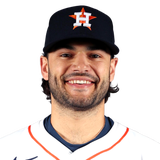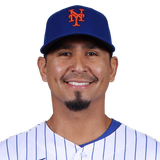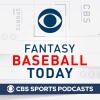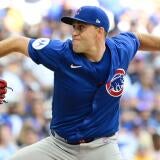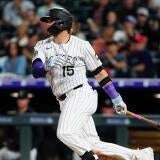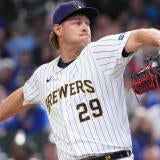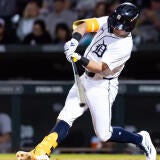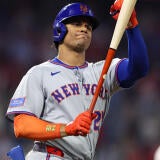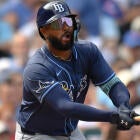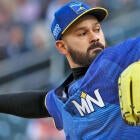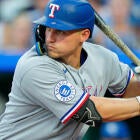2020 Fantasy Baseball Starting Pitcher Preview: Sleepers, breakouts, busts, top prospects, rankings
There just aren't enough aces to go around, so the draft prices keep rising for Fantasy managers, risks or not.
The question has never been whether you want an ace for your Fantasy baseball team. Of course you do; the more the better. The question is whether they are worth the investment it requires to get one on Draft Day. Once upon a time, the consensus in the Fantasy industry was that it wasn't really worth paying up for pitchers. In auctions, you were only supposed to spend a fraction of your total budget on pitchers, and paying a big price for high-end pitching was begging for risk — you could always find pitching on waivers.
That question becomes even harder to answer given the unprecedented circumstances we're facing with the prospect of an abbreviated season looming. Whether it is 50 or 76 or 100 games, this season is going to be one unlike any we've ever seen — and with how much pitcher results fluctuate with any given season, the risk level is higher than ever. And that's not even mentioning the increased injury risk involved with starting spring training, stopping for three months, and then trying to ramp back up.
We're likely to see more injuries, more variance, and smaller workloads for many pitchers in 2020. On the one hand, you can argue that makes getting an ace all the more valuable — Max Scherzer and Jacob deGrom won't need to be handled with kid's gloves. On the other hand, if pitchers are less of a sure thing across the board, maybe it makes more sense to invest in elite hitters and just throw crap against the wall at pitcher to see what sticks for a month or two.
Ultimately, given the unprecedented circumstances, there's no one right answer for how to approach things, and it's best to embrace that uncertainty. If your league mates are making high-end pitchers even more of a priority, pivot and go for values; if they are avoiding the aces, load up on them and give yourself a chance to survive the variance.
Starting Pitcher Preview
The Astros turned Cole into the best pitcher in the league. Can he keep it up in Yankee Stadium? Given the age of the two guys behind him, you have to bet on Cole.
| ||||||||||
DeGrom might be the second pitcher taken in many drafts, but it's a coin flip between him and Scherzer. He's a bit younger than the two guys ahead of him, and has been an elite run preventer in each of the last two years. His strikeout ceiling is a bit lower, but that's hardly a knock on him — deGrom is a worthy pick as soon as Cole is off the board.
| ||||||||||
Scherzer started showing signs of his age, as his string of 30-start seasons came to an end at 10 in 2019. He still threw 172.1 innings with a 2.92 ERA, so you don't want to overstate the case against him, but this is what happens when pitchers reach their mid-30s. He's still an ace, but there's some risk in his profile for the first time in years.
| ||||||||||
Buehler mostly managed to live up to expectations in 2019, and now he's likely to be a top-five pitcher in most drafts. He has elite velocity and a four-pitch mix with elite command, and it's always possible he goes back to throwing his changeup and gives opposing hitters one more weapon to deal with. There's a non-zero chance we're talking about Buehler as the No. 1 pitcher this time next year.
| ||||||||||
At 37, Verlander already carried enough risk to downgrade just a bit for Fantasy due to his age, and that was before a lat injury sidelined him in spring training and a groin injury required surgery. He is ready to pitch whenever Opening Day comes, but all of a sudden one of baseball's most reliable hurlers carries a ton of risk.
| ||||||||||
Bieber was a huge win for those of us who trust in advanced stats and peripherals, as his combination of elite control and strong strikeout rates allowed him to make the leap to the near-ace tier. He did it by limiting his fastball usage and relying more on his swing-and-miss pitches, which helped his fastball play up even more. There might be pitchers with more upside, but Bieber's profile looks about as safe as they come, with three straight seasons of at least 173 innings pitched going back to the minors.
| ||||||||||
When he was on the mound, Clevinger was just about as good as anyone in 2019, however he is already working his way back from spring knee surgery. If he is healthy, the question is if Clevinger can sustain his 33.9% strikeout rate, which would have been the fourth-highest in the league if he had enough innings to qualify.
| ||||||||||
It was a tale of two seasons for Flaherty, who struggled with a 4.90 ERA through his first 17 starts, and then posted a 0.93 mark in his final 16. What changed? He relied on his fastball less as the season went on, but it's not like the fastball was the source of his early troubles, so that isn't a super compelling argument for how he got better. It seems like a talented pitched just started executing better. Maybe the light just came on.
| ||||||||||
Strasburg finally stayed healthy, and would you look at that, he was one of the best pitchers in Fantasy. He made some changes to his approach, trading sliders for curveballs, and it led to his highest groundball rate since 2013 and an uptick in swinging strike rate. Still, the biggest reason Strasburg's standing has improved is because he stayed healthy, so it's up to you to decide if you want to buy into that happening again.
| ||||||||||
Corbin couldn't sustain all of the gains he made from his breakout 2018 season, but he also mostly proved it was no fluke, throwing 200 innings for the second straight season with elite strikeout numbers and a low-3.00s ERA. He's not as exciting or controversial as he was this time last year, but he's here to stay.
| ||||||||||
Giolito had a historic turnaround, dropping his ERA by nearly three full runs in his breakout season, and most of the peripheral stats back it up. If he can sustain the velocity spike that fueled it, he'll finally live up to that top prospect billing.
| ||||||||||
Castillo was one of the league's best pitchers in the first half, but slumped after the break. Still, he gets a ton of strikeouts and ground balls, and has shown plus control in the past. There's a ton of upside here if Castillo puts it together for a full season.
| ||||||||||
The days of Kershaw being the best pitcher in baseball are long gone, but we shouldn't overstate the extent to which he has regressed. Kershaw's season got off to a delayed start due to a shoulder issue, but he was on the mound by April 15 and didn't miss a start from that point on. Only three pitchers had more starts of at least six innings than Kershaw's 26, and his strikeout rate crept back up to 26.8% after falling to 23.9% in 2018, his lowest rate since he was a rookie. Kershaw has settled into the second half of his career as a rock-solid, dependable near-ace.
| ||||||||||
Morton might just be the best value on the board at starting pitcher. He was every bit as good as the Flaherty and Bieber class last season, but his age and lack of track record hold him back in many eyes.
| ||||||||||
There wasn't really any good explanation for Nola's struggles in 2019. His velocity didn't fall, he didn't miss any starts with injuries, and he didn't really change his pitch mix much. That's a good reason to think he'll bounce back in 2020, and he's being priced to do so.
| ||||||||||
As lucky as Snell was to have a 1.89 ERA in 2018, he was just as unlucky to sport a mark over 4.00 in 2019. In most respects, he looked like the same exact pitcher, and most of his peripherals back that up. Buying him coming off a down season makes a ton of sense, though his spring elbow woes are a red flag after he missed time with surgery on the same elbow last summer.
| ||||||||||
Paddack couldn't really have done much more to live up to expectations in his rookie season. Despite fewer than 40 innings above High-A, Paddack stepped on a major-league mound as an above-average pitcher, with elite control and plenty of strikeouts. The biggest question for his ceiling is whether he can develop a breaking ball to go along with his elite changeup that can help him get through the lineup a third time consistently.
| ||||||||||
The year is 2090. Most of Earth's surface is unlivable — the colonies on Mars are growing overpopulated. Zack Greinke has turned in his 73rd straight season with an ERA below 3.50. People have been waiting for Greinke to fall off for years, and he stubbornly refuses to do so. Expect the Astros to continue to get the most out of him.
| ||||||||||
For the first two months of the season, Darvish could barely find the strike zone, tossing 43 walks in 61 innings in his first 12 starts, with a 5.02 ERA to show for it. It was like a switch was flipped from that point on, however, as he walked just 15 batters in his final 19 starts, to go with a whopping 156 strikeouts. In the end, the numbers looked a lot like what you'd expect a Darvish season to look like.
| ||||||||||
For one glorious month (and change), Glasnow lived up to every hope anyone ever had for him. The big righty made seven starts to open the season, allowing just seven runs and seven walks in 43 innings with 46 strikeouts. The Rays worked with him to fix his delivery, and he became a strike throwing machine. Unfortunately, he would throw just 60.2 innings total in 2019, as an elbow injury sidelined him for most of the rest of the season. He came back in September and looked solid, but the control wasn't quite as sharp. There's top-five upside here, along with catastrophic risk that the improvements don't stick or the injury returns. You'll have to take a leap of faith, and a shorter season increases his chances of giving you a fulls season.
| ||||||||||
It didn't get as much publicity, but Gray's second-half was nearly as good as the likes of Darvish or Flaherty's were. Skepticism is warranted, given Gray's inconsistency, but he appears to have taken the lessons he learned from his tough time with the Yankees and applied them to become a better pitcher. If the strikeout rate is for real, Gray is going to be a great value for Fantasy.
| ||||||||||
Woodruff is a test case for how good a pitcher can be in 2019 without a truly plus secondary pitch. He racks up whiffs at a high level with his fastball, but his slider has a middling whiff rate, while his changeup got crushed. Few pitchers rely on their fastballs more than Woodruff did in 2019, and most of them don't get many strikeouts, so it's a tough needle to thread. He'll probably need to improve his slider to really take a step forward, but it's an enticing base to build from.
| ||||||||||
At this point, Berrios probably is what he is: A good, but not great pitcher. The flashes of dominance come and go, but overall, he's been a remarkably consistent pitcher over the last three seasons. He put in work this offseason on his curveball, with the intention of getting more strikeouts, and if he does, there might be another level Berrios can reach. If not, what he is is a reliable starting pitcher you won't have to think much about.
| ||||||||||
You can write Montas' breakout off as a result of the PED suspension he served in 2019, but that would be a mistake. Montas introduced a splitter into his repertoire at the beginning of 2019, and it immediately became his best pitch — a true out pitch. That fueled the breakout, and I have every reason to believe it was for real. He's never shown he can handle a full season's workload, but if he does, he could be an ace.
| ||||||||||
Don't forget about ...
When he's on, Paxton is as good as anyone. He's just not on — the mound or the top of his game — as often as you'd like. Still, there's ace upside here, and you don't really have to pay full price for it anymore. Don't be surprised if Year 2 in pinstripes goes better, especially with the season delayed enough for him to get back to full strength after offseason back surgery.
| ||||||||||||||||||||
Gallen wasn't even on many prospect radars before last season, but he was arguably the best pitcher in the minors before throwing 80 very good innings in the majors. He had a few bouts of uncharacteristic wildness in the majors, but if he can get back to his 2.4 BB/9 rate from his prospect days, there's borderline ace potential.
| ||||||||||||||||||||
There might be someone in your draft who loves Lamet enough to make him a top-100 pick, but if he falls to the 10th round or later, it could be worth pouncing on his upside. He's a two-pitch pitcher, so the margin for error is slim, but he could give you a 200-plus strikeout pace and a mid-3.00s ERA.
| ||||||||||||||||||||
It's not often you can get 240-strikeout upside around pick 150, which means Boyd obviously has some flaws in his game. Most notably, he struggles to keep the ball in the yard despite a home park that should help him out a lot in that regard. Still, if he can solve that issue, or at least keep it in check, you could be looking at a top-20 pitcher at a discount.
| ||||||||||||||||||||
Even including the minors, McCullers has never thrown more than 157 innings in a season, and you shouldn't expect much more than that coming off Tommy John surgery. However, you know the Astros are going to get the most out of him when he's on the mound, and with so few pitchers racking up big innings totals these days anyway, that's less of an issue for McCullers' value than it might have been, given how good he'll likely be on a per-inning basis.
| ||||||||||||||||||||
Starting Pitcher Sleeper, Breakout, & Bust
Can a guy with over 1,000 innings under his belt who has been a Fantasy mainstay for a half-decade really qualify as a sleeper? In Carrasco's case, yes. His ADP rests outside of the top 100, coming off a season where he threw 80 innings with a 5.29 ERA, but that doesn't even come close to telling the whole story. Carrasco had his season derailed due to a leukemia diagnosis in June, and while his numbers weren't where we expected them to be prior to the diagnosis, it seems fair to write that off as a result of the illness. This was and is a scary situation, but all indications are Carrasco has had a normal offseason and will be in the rotation to begin the season. He's a bit older than you might think at 33 on Opening Day, but he's been a near-ace caliber pitcher as recently as 2018. A bounceback season seems likely.
| ||||||||||||||||||||
It's interesting to compare Montas to Tyler Glasnow, as both enjoyed abbreviated breakout seasons. Glasnow was better, to be sure — 1.78 ERA, 3.18 SIERA for Glasnow; 2.63 ERA, 3.76 SIERA for Montas — but he also did it in just 60.2 innings, compared to 96 for Montas. More importantly. Glasnow's season was knocked off track due to an elbow injury that kept him out for three full months, while Montas was popped for a PED suspension in the midst of his breakout. It makes sense to bet on Glasnow being better — or at least having a higher ceiling — but Montas was quite good in his own right in 2019, fueled by the development of a splitter that turned into an immediate weapon. You're taking on quite a bit of risk in drafting Glasnow at his current cost, around SP24, in the sixth through eighth rounds. Montas, by comparison, comes off the board 50-70 picks later on average. I'll bet on Montas avoiding suspension and emerging as a viable No. 2 SP all season long.
| ||||||||||||||||||||
There's a lot to like about Clevinger, who flashed elite upside 2019 after establishing himself as a high-floor pitcher the previous two seasons. If you can get him as, say, the 10th pitcher off the board, there's a lot to like. Unfortunately, I've seen him go as high as the No. 5 starter, which is where the bust potential comes from. If his 2019 strikeout rate was real, he might be a top-three starter, but that represented a massive outlier for his career, even going back to the minors. That doesn't mean he can't sustain it, but you usually won't go broke betting against career seasons, and Clevinger's injury history doesn't seem to be factored into his price — he was limited to 21 starts last season, and already had knee surgery in spring training this season.
| ||||||||||||||||||||
Starting Pitcher Top Prospects
1. Jesus Luzardo, Athletics
Age (on opening day): 22
Where he played in 2019: Rookie, high Class A, Triple-A, majors
Minor-league stats: 2-1, 2.51 ERA, 1.02 WHIP, 43 IP, 8 BB, 57 K
Major-league stats: 0-0, 1.50 ERA, 0.67 WHIP, 12 IP, 3 BB, 16 K
A strained rotator cuff prevented Luzardo from claiming a rotation spot in spring training, and a strained lat kept him from doing it midseason. While his debut ultimately came in relief, it was as seamless as advertised, positioning him for an ace turn in 2020 with his three plus pitches and pinpoint command.
2. MacKenzie Gore, Padres
Age (on opening day): 21
Where he played in 2019: high Class A, Double-A
Minor-league stats: 9-2, 1.69 ERA, 0.83 WHIP, 101 IP, 28 BB, 135 K
The third overall pick in 2017 was always going to need some breaking in, being drafted out of high school, but is now beginning to look like the most talented pitcher in all the minors, falling just a few innings short of setting an all-time record with a 1.02 ERA in the notoriously hitter-friendly California League. He's like a left-handed Walker Buehler with his two plus breaking balls, and his long reach makes his fastball appear even faster.
3. Casey Mize, Tigers
Age (on opening day): 22
Where he played in 2019: high Class A, Double-A
Minor-league stats: 8-3, 2.55 ERA, 0.94 WHIP, 109 1/3 IP, 23 BB, 106 K
A bout with shoulder inflammation derailed what was a storybook first season for last year's No. 1 pick, one in which he put together a 0.92 ERA through 13 starts. It raises some durability concerns perhaps, but such efficient mastery of Double-A at such an early stage of development obviously speaks to his upside and readiness. More of the same in 2020 will necessitate a midseason call-up, rebuild or not.
4. Michael Kopech, White Sox
Age (on opening day): 23
Where he played in 2019: Did not play -- injured
2018 minors: 7-7, 3.70 ERA, 1.27 WHIP, 126 1/3 IP, 60 BB, 170 K
The 5.02 ERA from Kopech's four-start debut back in 2018 is misleading. One horrible start tipped off the need for Tommy John surgery, which has kept him sidelined since. But the buildup to that debut saw the prospect made famous for a 105-mph fastball dial it back just enough to find the strike zone with it, and the result was a 1.84 ERA, 0.98 WHIP and 12.1 K/9 over his final seven minor-league starts.
5. Nate Pearson, Blue Jays
Age (on opening day): 23
Where he played in 2019: high Class A, Double-A, Triple-A
Minor-league stats: 5-4, 2.30 ERA, 0.89 WHIP, 101 2/3 IP, 27 BB, 119 K
After a fractured forearm sidelined him for most of the previous year, Pearson was one of the biggest prospect risers of 2019, introducing himself as sort of the next Kopech with an 80-grade fastball and wipeout slider. The Blue Jays were excessively cautious with his workload, often limiting him to two innings in the early going and not letting him exceed five until almost August, so we'll need to see how his ratios hold up the third time through a lineup.
6. Forrest Whitley, Astros
7. Brendan McKay, Rays
8. Matt Manning, Tigers
9. Ian Anderson, Braves
10. Sixto Sanchez, Marlins
So which sleepers should you snatch in your draft? And which undervalued first baseman can help you win a championship? Visit SportsLine now to get rankings for every single position, all from the model that called Kenta Maeda's huge breakout last season, and find out.



